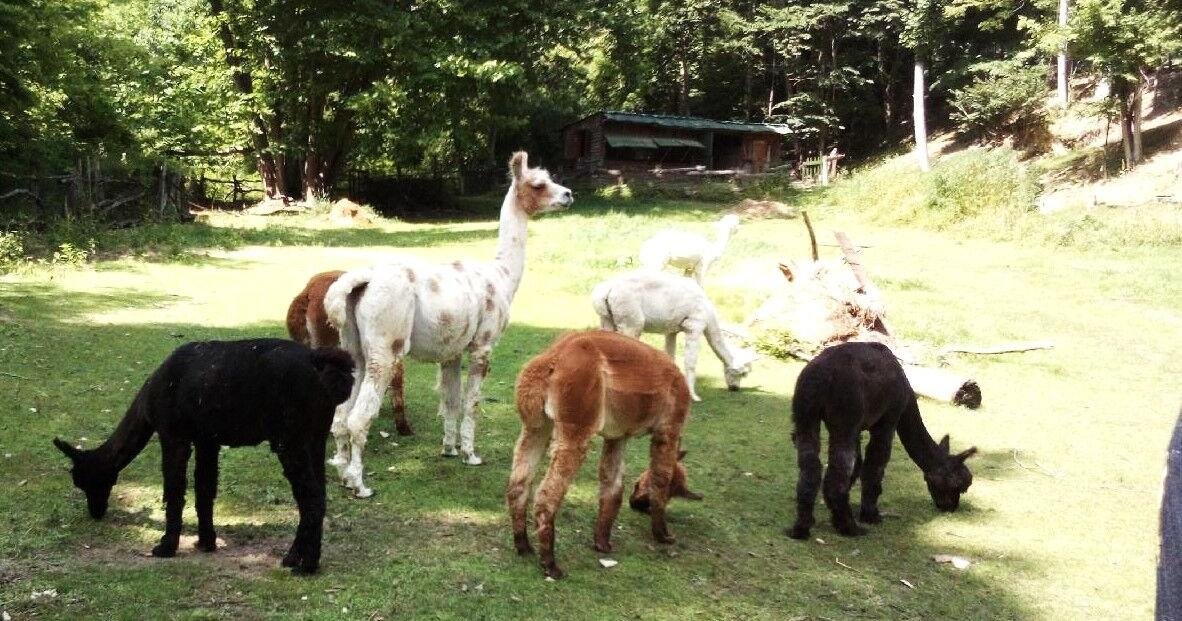[ad_1]
CATLETTSBURG Curious eyes greet visitors to Silver Run Alpaca Ranch. The herd of eight alpacas — plus one llama — has no idea it’s Kentucky Alpaca Fleece and Fiber Month.
But these animals are kept on the ranch for the very reason the Kentucky Alpaca Association and the Kentucky Department of Agriculture created the designation: to call attention to the value alpacas add to state agriculture.
“Alpacas add a uniqueness to Kentucky’s livestock communities,” Commissioner of Agriculture Dr. Ryan Quarles said. “In addition to the economical benefit they bring the farms that have added them to their numbers, alpacas produce beautiful, soft, cashmere-like fleece.”
Ranch owner Kevin Toney and his brother, Chris, operate the ranch; they have the fleece processed into yarn and use natural dyes to color it. They also weave the fiber into blankets, ponchos, scarves and many other items to sell. They also take commissions.
Kentucky’s agricultural economy benefits from alpaca producers because of their focus on fiber and fiber products, agritourism, and breeding for livestock sales and seedstock, Quarles said, with the state having more than 200 mixed-livestock and family farms raising alpacas.
Toney, who is a member of the Kentucky Alpaca Association, said the Tri-State hasn’t seen much economic benefit from the alpaca industry yet. He said he believes his business is the only one in the region raising alpaca for fleece and turning it into sellable products. But there are people in the area who have alpacas on their land.
“They are nice, exotic animals to have as back yard pets,” Toney said. “And sometimes gentlemen farmers might want them for something that’s different.”
The Department of Agriculture estimates alpacas can be found in nearly every Kentucky county, even if they aren’t involved in a money-making project.
But he warns there are a few “musts” to having them.
“They are pack animals. You need no less than three,” he said, noting they don’t mix well with all animals. Because of their relatively close genetics, they can mix with llamas.
Day-to-day care is easy: provide hay, grazing areas and fresh water.
Problems occur when there is a health issue in the herd.
“There’s only one vet in the area who takes care of alpaca, so if he’s not available, there is no backup,” Toney said.
There are special health problems to look for among alpaca, which are native to Peru and Bolivia. They include parasites and cancer, which is why veterinary care is so important.
Toney shows his alpaca and llama the same attention and care he shows his dogs; they all have names and he goes the extra mile to keep them healthy and safe. In return, they provide fiber for his weaving. The historical significance isn’t lost on Toney. In fact, it’s crucial to the satisfaction he gets from his projects.
“Alpaca fleece is very soft,” he said. “It was traditionally reserved for nobility and royalty.
“Llama hair is more coarse and was used for the clothing for the common people.”
Some of the items he creates are historically significant, too. For example, he’s taking taking measures to be as accurate as possible making a piece using the tartan plaid of a local family of Scottish descent.
To celebrate alpacas this month:
The Alpaca Owners Association opens its National Fleece Show and a National Fleece and Fiber Conference today, continuing through Sunday, at the Boone County Cooperative Extension in Burlington.
The All Suri Fleece show, hosted by The Suri Network, will be Tuesday and Wednesday at the Boone County Cooperative Extension office in Burlington. Suri is a breed of alpaca.
The Kentucky Fiber Trail will have the second annual Bluegrass Yarn and Fiber Crawl from July 28 to Aug. 6, which will feature more than 25 retail and farm locations across the state with yard and natural fiber products for sale.
(606) 326-2661 |
lward@dailyindependent.com
[ad_2]
Source link



